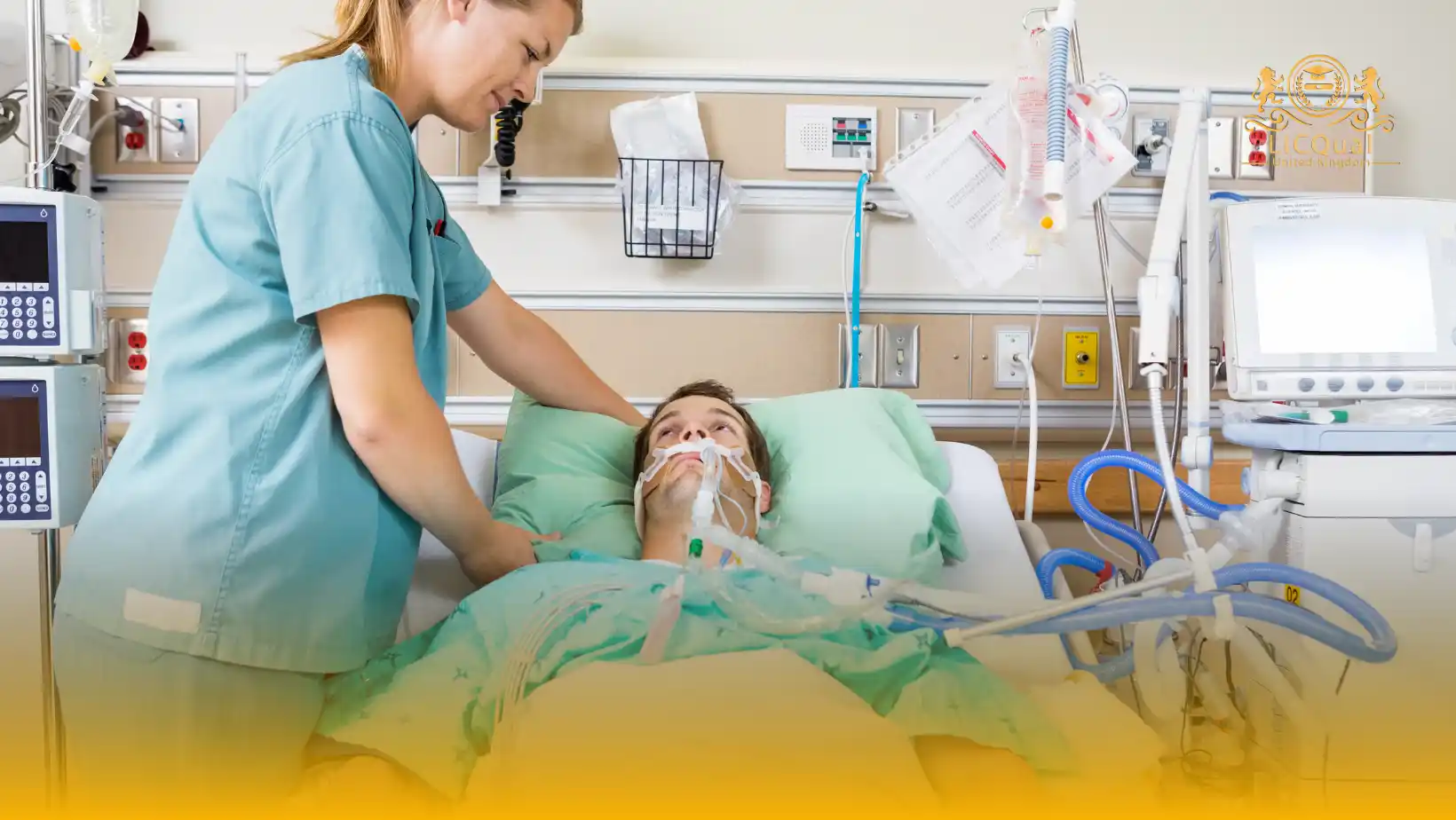The LICQual Level 3 Certificate in Critical Care Medicine (Cert CCM) is a specialized qualification designed for healthcare professionals who wish to advance their expertise in critical and intensive care settings. This qualification is not intended for fresh candidates but is aimed at learners with prior medical or healthcare experience seeking to enhance their career prospects, expand their knowledge, and strengthen their Continuing Professional Development (CPD).
Through this course, learners will gain an in-depth understanding of critical care principles, including patient monitoring, advanced life support, emergency interventions, and the management of complex medical conditions. The curriculum combines evidence-based theoretical knowledge with practical skills, ensuring learners are fully prepared to make informed decisions in high-pressure clinical environments.
LICQual ensures that centres delivering this qualification maintain the highest standards of teaching and learning. Centres must employ competent and qualified staff and provide learners with all necessary resources, training equipment, and learning materials to guarantee a comprehensive and effective educational experience. This ensures learners receive the support required to achieve their learning objectives and apply their skills confidently in professional critical care settings.
Ideal for professionals who aspire to strengthen their clinical expertise, improve patient outcomes, and advance their careers in critical care, the LICQual Level 3 Certificate in Critical Care Medicine offers a structured, career-focused pathway for advanced learning in one of the most demanding areas of healthcare.
Course Overview
Qualification Title
LICQual Level 3 Certificate in Critical Care Medicine (Cert CCM)
Total Units
6
Total Credits
24
GLH
120
Qualification #
LICQ2200844
Qualification Specification
To enroll in the LICQual Level 3 Certificate in Critical Care Medicine (Cert CCM) , applicants must meet the following criteria:
|
Qualification# |
Unit Title |
Credits |
GLH |
|---|---|---|---|
|
LICQ2200844-1 |
Principles of Critical Care Medicine |
4 |
20 |
|
LICQ2200844-2 |
Advanced Patient Monitoring and Assessment |
4 |
20 |
|
LICQ2200844-3 |
Life Support and Emergency Interventions |
4 |
20 |
|
LICQ2200844-4 |
Critical Care Pharmacology and Therapeutics |
4 |
20 |
|
LICQ2200844-5 |
Infection Control and Critical Care Safety |
4 |
20 |
|
LICQ2200844-6 |
Professional Practice, Ethics, and Continuing Professional Development (CPD) |
4 |
20 |
By the end of this course, learners will be able to:
Unit 1: Principles of Critical Care Medicine
By the end of this unit, learners will be able to:
- Explain the scope and significance of critical care medicine in modern healthcare.
- Analyse patient assessment techniques and early warning systems for critically ill patients.
- Evaluate physiological changes associated with critical illness.
- Apply ethical decision-making principles in critical care scenarios.
Unit 2: Advanced Patient Monitoring and Assessment
By the end of this unit, learners will be able to:
- Interpret vital signs, hemodynamic data, and organ function indicators.
- Conduct comprehensive assessments of critically ill patients.
- Identify early warning signs of patient deterioration.
- Implement appropriate interventions based on assessment findings.
Unit 3: Life Support and Emergency Interventions
By the end of this unit, learners will be able to:
- Apply advanced life support protocols in emergency situations.
- Demonstrate airway management, resuscitation techniques, and circulatory support.
- Manage common critical care emergencies, including shock and respiratory failure.
- Integrate pharmacological support into emergency patient management.
Unit 4: Critical Care Pharmacology and Therapeutics
By the end of this unit, learners will be able to:
- Explain the mechanisms of action of drugs commonly used in critical care.
- Apply correct dosing, administration methods, and monitor potential adverse effects.
- Evaluate therapeutic strategies for patient-specific scenarios.
- Optimise patient outcomes through evidence-based pharmacological interventions.
Unit 5: Infection Control and Critical Care Safety
By the end of this unit, learners will be able to:
- Implement infection prevention and control measures in critical care settings.
- Apply best practices for hygiene, isolation, and sterilisation of equipment.
- Evaluate patient safety protocols and identify potential risks.
- Integrate evidence-based strategies to minimise complications in critical care environments.
Unit 6: Professional Practice, Ethics, and Continuing Professional Development (CPD)
By the end of this unit, learners will be able to:
- Demonstrate professional and ethical responsibilities in critical care practice.
- Communicate effectively with patients, families, and multidisciplinary teams.
- Reflect on clinical practice to enhance decision-making and patient care.
- Plan and actively engage in CPD to maintain and improve professional competence.
The LICQual Level 3 Certificate in Critical Care Medicine (Cert CCM) is designed for healthcare professionals who want to strengthen their expertise in intensive and emergency care. This Critical Care Medicine Level 3 qualification is ideal for doctors, nurses, and allied health practitioners who aim to enhance their clinical skills, gain international recognition, and advance their careers in hospitals, ICUs, and emergency departments. Whether you are seeking a career‑boosting qualification or looking to expand your CPD portfolio, this program provides the right balance of theory and practical application.
1. Doctors and Physicians in Critical & Intensive Care
- Enhance decision‑making skills in high‑pressure environments
- Gain advanced knowledge in ventilator management and sepsis care
- Strengthen credentials with a globally recognized certification
- Improve patient outcomes through evidence‑based practice
- Boost career progression in hospitals and specialized care units
2. Registered Nurses and ICU Staff
- Develop advanced patient monitoring and life support skills
- Earn a CPD‑accredited qualification to support career growth
- Gain confidence in handling critically ill patients
- Learn international best practices in intensive care
- Increase employability in both local and global healthcare systems
3. Emergency and Trauma Care Professionals
- Build expertise in rapid response and emergency interventions
- Learn structured protocols for critical care emergencies
- Strengthen qualifications for high‑demand emergency roles
- Improve teamwork and communication in trauma settings
- Advance career opportunities in ER and trauma centers
4. Allied Health Practitioners (Paramedics, Respiratory Therapists, etc.)
- Expand scope of practice with critical care competencies
- Gain recognition through an industry‑approved qualification
- Learn advanced airway and ventilatory support techniques
- Improve patient safety and clinical decision‑making
- Enhance career mobility across healthcare sectors
5. Medical Students and Early‑Career Professionals
- Build a strong foundation in Critical Care Medicine training
- Gain a competitive edge in postgraduate applications
- Learn practical skills alongside theoretical knowledge
- Demonstrate commitment to professional development
- Position yourself for future roles in ICU and emergency care
6. Healthcare Administrators and Educators
- Understand the clinical demands of critical care environments
- Strengthen leadership in training and staff development
- Gain insights into international standards of care
- Support institutional compliance with CPD requirements
- Enhance credibility as a healthcare trainer or manager
7. International Healthcare Professionals Seeking Recognition
- Earn a career‑boosting qualification recognized worldwide
- Align with global healthcare standards and protocols
- Improve employability in international hospitals and clinics
- Gain flexible online learning suited to global professionals
- Demonstrate commitment to continuous professional growth
To deliver the LICQual Level 3 Certificate in Critical Care Medicine effectively and ensure learner success, centres must meet the following requirements:
- Qualified and Competent Staff: Centres must employ experienced healthcare professionals and qualified instructors with expertise in critical care medicine. Staff should be capable of delivering both theoretical knowledge and practical training to international standards.
- Comprehensive Learning Resources: Centres must provide learners with access to up-to-date textbooks, reference materials, case studies, and digital resources to support effective learning and understanding.
- Practical Training Facilities: Centres should be equipped with adequate laboratory facilities, simulation equipment, and clinical training tools to allow learners to practice critical care techniques safely and effectively.
- Assessment and Support Systems: Centres must implement robust assessment strategies, including written assignments, practical evaluations, and feedback mechanisms. Learners should receive mentoring and guidance throughout the course.
- Health and Safety Compliance: Centres must maintain safe, clean, and well-organized learning environments that comply with local health and safety regulations, ensuring learner and patient safety during practical sessions.
- Continuing Professional Development (CPD) Opportunities: Centres should encourage learners to engage in CPD activities, helping them maintain professional competence and stay updated with advances in critical care medicine.
- Access to Digital and Online Learning Tools: Centres should provide reliable access to e-learning platforms, virtual simulations, and supplementary online resources to enhance learning and flexibility.
By meeting these standards, centres ensure that learners receive high-quality, professional training that equips them with the knowledge, skills, and confidence to excel in critical care medicine and related healthcare fields.
Assessment and Verification
All units within this qualification are subject to internal assessment by the approved centre and external verification by LICQual. The qualification follows a criterion-referenced assessment approach, ensuring that learners meet all specified learning outcomes.
To achieve a ‘Pass’ in any unit, learners must provide valid, sufficient, and authentic evidence demonstrating their attainment of all learning outcomes and compliance with the prescribed assessment criteria. The Assessor is responsible for evaluating the evidence and determining whether the learner has successfully met the required standards.
Assessors must maintain a clear and comprehensive audit trail, documenting the basis for their assessment decisions to ensure transparency, consistency, and compliance with quality assurance requirements.







